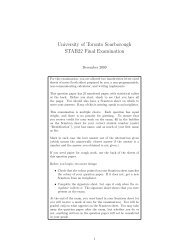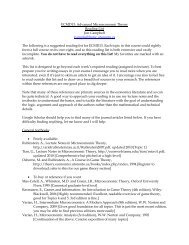Annual Review - University of Toronto Scarborough
Annual Review - University of Toronto Scarborough
Annual Review - University of Toronto Scarborough
Create successful ePaper yourself
Turn your PDF publications into a flip-book with our unique Google optimized e-Paper software.
ePort on teaching & research<br />
WoUld yoU describe Utsc as<br />
a local or an international<br />
<strong>University</strong> exPerience?<br />
rh qBecause <strong>of</strong> the diverse nature<br />
<strong>of</strong> our community, internationalism<br />
is not an abstract concept at UTSC.<br />
you see this in a very real and palpable<br />
way. And that’s helped propel us<br />
on a course <strong>of</strong> action, not just in<br />
our community here in the eastern<br />
end <strong>of</strong> the City <strong>of</strong> <strong>Toronto</strong> but also<br />
abroad. we have programs such as<br />
International Development Studies,<br />
which is unique at UTSC. we train<br />
students to work in the developing<br />
world and bring together areas<br />
<strong>of</strong> knowledge that <strong>of</strong>ten are treated<br />
separately: economics, the<br />
environment, environmental<br />
health, and health in general.<br />
in the world, and it allows us to <strong>of</strong>fer<br />
something that has not been paralleled<br />
elsewhere in Canada, or indeed<br />
throughout higher education.<br />
increasingly, Utsc emPhasizes<br />
“exPeriential” rather than<br />
“co-oP” oPPortUnities.<br />
can yoU exPlain this?<br />
rh qFor many years, we were<br />
regarded as the co-op campus, and<br />
it’s certainly true we’re the one campus<br />
at <strong>University</strong> <strong>of</strong> <strong>Toronto</strong> that runs<br />
a range <strong>of</strong> co-operative education<br />
programs. But that only begins to<br />
capture the experiential piece. we’re<br />
working to develop experiential<br />
opportunities for our students. These<br />
run the gamut from formal co-op<br />
range from biodiversity measures in<br />
ecosystems to the cultural practices and<br />
language use in human communities.<br />
What else makes the Utsc<br />
camPUs a UniqUe exPerience?<br />
mc qAll <strong>of</strong> the excellent dynamics<br />
that you come across on the downtown<br />
U <strong>of</strong> T campus are amplified here<br />
at UTSC because <strong>of</strong> our relationship<br />
with our surroundings, the nature<br />
<strong>of</strong> our student body and our<br />
community spirit. what is remarkable<br />
about UTSC is that delivery <strong>of</strong> the<br />
U <strong>of</strong> T experience, which is part <strong>of</strong><br />
our institutional DNA, is improved by<br />
virtue <strong>of</strong> our size – big enough to have<br />
critical mass and momentum, but small<br />
enough to have proper community<br />
spirit and connectivity.<br />
Consider our green Path program.<br />
we recruit directly out <strong>of</strong> a number<br />
<strong>of</strong> Chinese high schools from all over<br />
the People’s Republic <strong>of</strong> China and<br />
bring in about 180 students a year to<br />
UTSC, and they form a very important<br />
part <strong>of</strong> our community. we’re currently<br />
developing similar programs for other<br />
regions. what I can do, when I’m out<br />
recruiting those students, is tell them<br />
that by coming to UTSC, they’re not<br />
simply coming to study alongside<br />
Canadians; they’re coming to study<br />
alongside Pakistani Canadians, Somali<br />
Canadians, Indo-Canadians, Nigerian<br />
Canadians and so on. This learning<br />
environment is probably the most<br />
unique, multicultural and diverse<br />
placements that take them away<br />
from the university setting, away<br />
from the classroom, and put them<br />
in a workplace setting to something<br />
broader, where experience – such<br />
as volunteer activity – gets woven<br />
directly into the classroom experience.<br />
And so, the degree-learning expectations,<br />
the pedagogical outcomes, take<br />
into account learning that might take<br />
place out in the community or in<br />
a non-academic setting.<br />
mc qexperiential learning actually<br />
extends to the research arena, where<br />
students roll up their sleeves and dig<br />
in, whether that means operating a<br />
pipette, being immersed in archives,<br />
being involved in field studies that<br />
rh qwe have an ambitious master<br />
plan for the campus that is largely<br />
about the built environment. It takes<br />
an active imagination to picture the<br />
intellectual and academic milieu<br />
that will emerge as the campus<br />
grows. It’s about moving things as<br />
far forward as we can while our<br />
watch is on. And one <strong>of</strong> the most<br />
exciting and rewarding things here<br />
is working with colleagues who<br />
are completely committed to the<br />
collective project <strong>of</strong> the <strong>University</strong><br />
<strong>of</strong> <strong>Toronto</strong> <strong>Scarborough</strong>. n<br />
8 UNIVeRSITy oF ToRoNTo SCARBoRoUgH


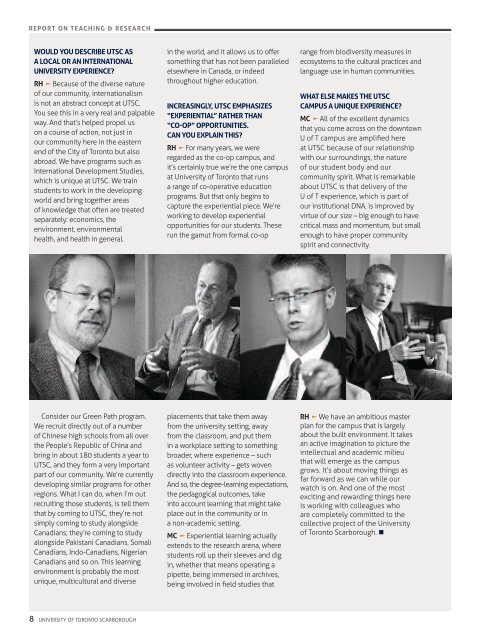
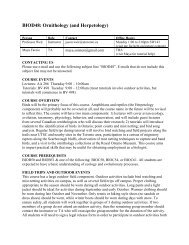
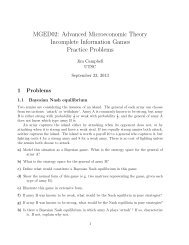
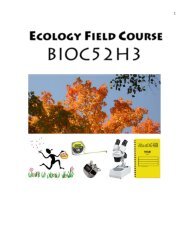
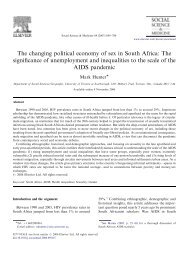
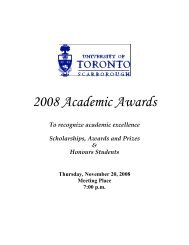
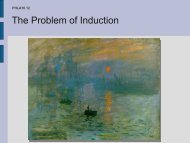
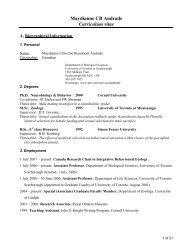
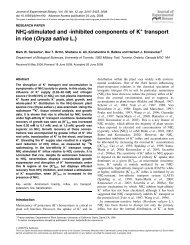
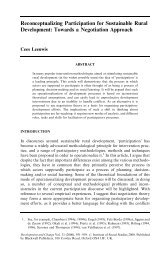
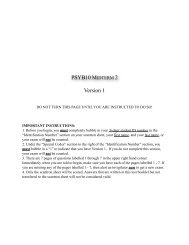
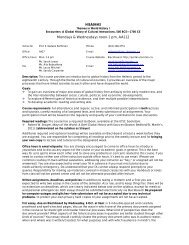
![[Enter course name - Syllabus] - University of Toronto Scarborough](https://img.yumpu.com/50068522/1/190x245/enter-course-name-syllabus-university-of-toronto-scarborough.jpg?quality=85)
